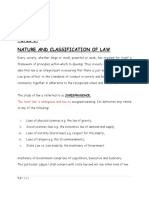Business Law Study
Business Law Study
Uploaded by
Sapphire SatoCopyright:
Available Formats
Business Law Study
Business Law Study
Uploaded by
Sapphire SatoCopyright
Available Formats
Share this document
Did you find this document useful?
Is this content inappropriate?
Copyright:
Available Formats
Business Law Study
Business Law Study
Uploaded by
Sapphire SatoCopyright:
Available Formats
americans with disability act The Americans with Disabilities Act of 1990[1][2] (ADA) is a law that was enacted
by the U.S. Congress in 1990. It was signed into law on July 26, 1990, by President George H. W. Bush, and later amended with changes effective January 1, 2009.[3] The ADA is a wide-ranging civil rights law that prohibits, under certain circumstances, discrimination based on disability. It affords similar protections against discrimination to Americans with disabilities as the Civil Rights Act of 1964,[4] which made discrimination based on race, religion, sex, national origin, and other characteristics illegal. Disability is defined by the ADA as "a physical or mental impairment that substantially limits a major life activity." The determination of whether any particular condition is considered a disability is made on a case by case basis. Certain specific conditions are excluded as disabilities, such as current substance abuse and visual impairment which is correctable by prescription lenses. foreign corrupt practices act The Foreign Corrupt Practices Act of 1977 (FCPA) (15 U.S.C. 78dd-1, et seq.) is a United States federal law known primarily for two of its main provisions, one that addresses accounting transparency requirements under the Securities Exchange Act of 1934 and another concerning bribery of foreign officials. securities act Congress enacted the Securities Act of 1933 in the aftermath of the stock market crash of 1929 and during the ensuing Great Depression. Legislated pursuant to the interstate commerce clause of the Constitution, it requires that any offer or sale of securities using the means and instrumentalities of interstate commerce be registered pursuant to the 1933 Act, unless an exemption from registration exists under the law. The 1933 Act was the first major federal legislation to regulate the offer and sale of securities. Prior to the Act, regulation of securities was chiefly governed by state laws, commonly referred to as blue sky laws. When Congress enacted the 1933 Act, it left in place a patchwork of existing state securities laws to supplement federal laws in part because there were questions as to the constitutionality of federal legislation.
scope of jurisdiction with FTC, SEC Federal Register
The Federal Register (since March 14, 1936), abbreviated FR, or sometimes Fed. Reg.) is the official journal of the federal government of the United States that contains most routine publications and public notices of government agencies. It is a daily (except holidays) publication.The Federal Register is compiled by the Office of the Federal Register (within the National Archives and Records Administration) and is printed by the Government Printing Office.There are no copyright restrictions on the Federal Register: as a work of the U.S. government, it is in the public domain. Fair Credit Reporting Act he Fair Credit Reporting Act (FCRA) is a United States federal law that regulates the collection, dissemination, and use of consumer information, including consumer credit information. Along with the Fair Debt Collection Practices Act (FDCPA), it forms the base of consumer credit rights in the United States. It was originally passed in 1970, and is enforced by the US Federal Trade Commission and private litigants. jurisprudence Jurisprudence is the theory and philosophy of law. Scholars of jurisprudence, or legal theorists (including legal philosophers and social theorists of law), hope to obtain a deeper understanding of the nature of law, of legal reasoning, legal systems and of legal institutions. Modern jurisprudence began in the 18th century and was focused on the first principles of the natural law, civil law, and the law of nations types of damages within a contract liquidated v. punitive damages Liquidated damages (also referred to as liquidated and ascertained damages) are damages whose amount the parties designate during the formation of a contract for the injured party to collect as compensation upon a specific breach (e.g., late performance). Punitive damages or exemplary damages are damages intended to reform or deter the defendant and others from engaging in conduct similar to that which formed the basis of the lawsuit. Although the purpose of punitive damages is not to compensate the plaintiff, the plaintiff will in fact receive all or some portion of the punitive damage award. initially selling stock to public administrative procedural act The Administrative Procedure Act (APA), is the United States federal law that
governs the way in which administrative agencies of the federal government of the United States may propose and establish regulations. The APA also sets up a process for the United States federal courts to directly review agency decisions. It is one of the most important pieces of United States administrative law. The Act became law in 1946. fiduciary A fiduciary duty (from Latin fiduciarius, meaning "(holding) in trust"; from fides, meaning "faith", and fiducia, meaning "trust") is a legal or ethical relationship of confidence or trust regarding the management of money or property between two or more parties, most commonly a fiduciary and a principal. One party, for example a corporate trust company or the trust department of a bank, holds a fiduciary relation or acts in a fiduciary capacity to another, such as one whose funds are entrusted to it for investment. In a fiduciary relation one person, in a position of vulnerability, justifiably reposes confidence, good faith, reliance and trust in another whose aid, advice or protection is sought in some matter. In such a relation good conscience requires one to act at all times for the sole benefit and interests of another, with loyalty to those interests. types of restitutions judges can order accord and satisfaction Accord and satisfaction is a contract law concept about the purchase of the release from a debt obligation. The payment is typically less than what is owed and is not paid by the actual performance of the original obligation. The accord is the agreement to discharge the obligation and the satisfaction is the legal "consideration" which binds the parties to the agreement. If a person is sued over an alleged debt, that person bears the burden of proving the affirmative defense of accord and satisfaction. details about statute of frauds The statute of frauds refers to the requirement that certain kinds of contracts be memorialized in a signed writing with sufficient content to evidence the contract. Traditionally, the statute of frauds requires a signed writing in the following circumstances: Contracts in consideration of marriage. This provision covers prenuptial agreements. Contracts which cannot be performed within one year. However, contracts of
indefinite duration do not fall under the statute of frauds regardless of how long the performance actually takes. Contracts for the transfer of an interest in land. This applies not only to a contract to sell land but also to any other contract in which land or an interest in it is disposed, such as the grant of a mortgage or an easement. Contracts by the executor of a will to pay a debt of the estate with his own money. Contracts for the sale of goods involving a purchase price of $500 or more. Contracts in which one party becomes a surety (acts as guarantor) for another party's debt or other obligation. This can be remembered by the mnemonic "MY LEGS": Marriage, one year, land, executor, goods, surety; or Marriage, one year, land, executor, guarantor, sale.
tort v. criminal A tort, in common law jurisdictions, is a wrong that involves a breach of a civil duty owed to someone else. It is differentiated from a crime, which involves a breach of a duty owed to society in general. Though many acts are both torts and crimes, prosecutions for crime are mostly the responsibility of the state, private prosecutions being rarely used; whereas any party who has been injured may bring a lawsuit for tort. One who commits a tortious act is called a tortfeasor. The equivalent of tort in civil law jurisdictions is delict. Crime is the breach of rules or laws for which some governing authority (via mechanisms such as legal systems) can ultimately prescribe a conviction. Individual human societies may each define crime and crimes differently, in different localities (state, local, international), at different time stages of the so-called "crime" (planning, disclosure, supposedly intended, supposedly prepared, incompleted, completed or futuristically proclaimed after the "crime". what isn't covered by title VII Title VII prohibits employment discrimination based on race, color, religion, sex and national origin. questions about contracts applying to minors contracts by minors can be abandoned by either party.
500$ purchases - contract-wise sale of goods over $500 must be in writing?? strict liability In law, strict liability is a standard for liability which may exist in either a criminal or civil context. A rule specifying strict liability makes a person legally responsible for the damage and loss caused by his or her acts and omissions regardless of culpability (including fault in criminal law terms, typically the presence of mens rea). Strict liability is prominent in tort law (especially product liability), corporations law, and criminal law. commercial speech Commercial Speech is speech done on behalf of a company or individual for the intent of making a profit. It is economic in nature and usually has the intent of convincing the audience to partake in a particular action, often purchasing a specific product. unilateral/bilateral contracts Contracts may be bilateral or unilateral. A bilateral contract is the kind of contract that most people think of when they think "contract" and indeed represents the vast majority of contracts. It is an agreement in which each of the parties to the contract makes a promise or set of promises to the other party or parties. For example, in a contract for the sale of a home, the buyer promises to pay the seller $200,000 in exchange for the seller's promise to deliver title to the property. In a unilateral contract, only one party to the contract makes a promise. A typical example is the reward contract: A promises to pay a reward to B if B finds A's dog. B is not under an obligation to find A's dog, but A is under an obligation to pay the reward to B if B does find the dog. The consideration for the contract here is B's reliance on A's promise or B giving up his legal right to do whatever he wanted at the time he was engaged in the finding of the dog. breach of contract Breach of contract is a legal cause of action in which a binding agreement or bargained-for exchange is not honored by one or more of the parties to the contract by non-performance or interference with the other party's performance. If the party does not fulfill his contractual promise, or has given information to the other party that he will not perform his duty as mentioned in the contract or if by his action and conduct he seems to be unable to perform the contract, he is said to breach the contract.
puffery Puffery as a legal term refers to promotional statements and claims that express subjective rather than objective views, such that no reasonable person would take them literally.[1] Puffery serves to "puff up" an exaggerated image of what is being described and is especially featured in testimonials. consumer protection Consumer protection laws are designed to ensure fair trade competition and the free flow of truthful information in the marketplace. The laws are designed to prevent businesses that engage in fraud or specified unfair practices from gaining an advantage over competitors and may provide additional protection for the weak and those unable to take care of themselves. Consumer Protection laws are a form of government regulation which aim to protect the rights of consumers. For example, a government may require businesses to disclose detailed information about products particularly in areas where safety or public health is an issue, such as food. Consumer protection is linked to the idea of "consumer rights" (that consumers have various rights as consumers), and to the formation of consumer organizations which help consumers make better choices in the marketplace. void, voidable, invaliddifferences betwixt them, etc. A void contract, also known as a void agreement, is not actually a contract. A void contract cannot be enforced by law. Void contracts are different from voidable contracts, which are contracts that may be (but not necessarily will be) nullified. procedural v. substantive Procedural law comprises the rules by which a court hears and determines what happens in civil lawsuit, criminal or administrative proceedings. The rules are designed to ensure a fair and consistent application of due process (in the U.S.) or fundamental justice (in other common law countries) to all cases that come before a court. The substantive law, which refers to the actual claims and defenses whose validity is tested through the procedures of procedural law, is different than procedural law utilitarianism Utilitarianism (also: utilism) is the idea that the moral worth of an action is determined solely by its usefulness in maximizing utility and minimizing negative utility (utility can be defined as pleasure minus pain, preference satisfaction, knowledge or other things) as summed among all sentient
beings. It is thus a form of consequentialism, meaning that the moral worth of an action is determined by its outcome. civil law v. common law Civil law, as opposed to criminal law, is the branch of law dealing with disputes between individuals and/or organizations, in which compensation may be awarded to the victim. For instance, if a car crash victim claims damages against the driver for loss or injury sustained in an accident, this will be a civil law case.[1] In the common law, civil law is the area of laws and justice that affect the legal status of individuals. Civil law, in this sense, is usually referred to In the common law, civil law is the area of laws and justice that affect the legal status of individuals. Civil law, in this sense, is usually referred to in comparison to criminal law, which is that body of law involving the state against individuals (including incorporated organizations) where the state relies on the power given it by statutory law. Civil law may also be compared to military law, administrative law and constitutional law (the laws governing the political and law making process), and international law. Where there are legal options for causes of action by individuals within any of these areas of law, it is thereby civil law.
counteroffer, revocation, various responses with contract
third party beneficiary
novation
assignment
concerning how long an offer remains open, what can happen to the offer, etc.
what would not be considered "the law of the land"
know various constitutional amendments pertaining to biz law
nonconforming goods
venue
administrative remedies
Contracts for the International Sale of Goods
You might also like
- New General Mathematics For Secondary Schools 1 TG Full PDFDocument60 pagesNew General Mathematics For Secondary Schools 1 TG Full PDFMark Juniel Monzon69% (32)
- Law On Obligations and Contracts: By: Hector de LeonDocument36 pagesLaw On Obligations and Contracts: By: Hector de LeonGabriel Sinco100% (2)
- Code Breaker; The § 83 Equation: The Tax Code’s Forgotten ParagraphFrom EverandCode Breaker; The § 83 Equation: The Tax Code’s Forgotten ParagraphRating: 4 out of 5 stars4/5 (3)
- Traffic Ticket Happy Meal #1Document14 pagesTraffic Ticket Happy Meal #1Rick Jimenez100% (9)
- 1877 The Three Worlds PDFDocument197 pages1877 The Three Worlds PDFjesusishorusNo ratings yet
- UNITED STATES Incorporated in England in 1871Document4 pagesUNITED STATES Incorporated in England in 1871in1or100% (4)
- Manalo, Cristian James P. November 07, 2020 BSA 2-11 SawsaDocument5 pagesManalo, Cristian James P. November 07, 2020 BSA 2-11 SawsaCristian James ManaloNo ratings yet
- Answer Case Study-Smart CityDocument2 pagesAnswer Case Study-Smart CityRizky Almadinah AgustyNo ratings yet
- The Law On Obligations and Contracts: By: Mary Chris Austria-Cruz, PH. D. Marilou P. Pascual, PH.DDocument9 pagesThe Law On Obligations and Contracts: By: Mary Chris Austria-Cruz, PH. D. Marilou P. Pascual, PH.DRennejarek BenitezNo ratings yet
- Chapter 1 (Obli)Document9 pagesChapter 1 (Obli)Rennejarek BenitezNo ratings yet
- UNIT3, Point BDocument19 pagesUNIT3, Point BHarsh SharmaNo ratings yet
- Law Chapter 1, 2 and 4: Learning Unit 1: Introduction To The Law of Contract Read: M.A. Fouché 8Document10 pagesLaw Chapter 1, 2 and 4: Learning Unit 1: Introduction To The Law of Contract Read: M.A. Fouché 8maake glendaNo ratings yet
- Introduction To Civil Law II - FinalDocument64 pagesIntroduction To Civil Law II - FinalchrisNo ratings yet
- Introduction To Buss Law Topic 1Document14 pagesIntroduction To Buss Law Topic 1dambiha dambeheNo ratings yet
- Lecture Notes On The Law of ContractsDocument43 pagesLecture Notes On The Law of Contractsteshomegeleta891No ratings yet
- Common-Law Trust Consumer/Consumer Protection Laws Defined Public Notice/Public RecordDocument3 pagesCommon-Law Trust Consumer/Consumer Protection Laws Defined Public Notice/Public Recordin1or100% (1)
- Civil LawDocument3 pagesCivil Lawfaisal awaisNo ratings yet
- Constitutional Criminal Complaint 12-29-11Document119 pagesConstitutional Criminal Complaint 12-29-11Phil100% (8)
- Phil 106 NotesDocument47 pagesPhil 106 NotesnashonodhimboNo ratings yet
- Right 8Document7 pagesRight 8Abc FghNo ratings yet
- Conflict of LawsDocument31 pagesConflict of LawsCarlie MaeNo ratings yet
- Tutorial 1 AnsDocument7 pagesTutorial 1 AnsCassandra LeeNo ratings yet
- Anatomy of BondsDocument0 pagesAnatomy of Bondsalmaurikanos100% (2)
- BL Law of ContractsDocument44 pagesBL Law of ContractsAbay BogaleNo ratings yet
- Bussiness Law, B.MGTDocument29 pagesBussiness Law, B.MGTanatoliNo ratings yet
- Strawman FallacyDocument8 pagesStrawman Fallacythaceo@gmail.com100% (3)
- Introduction To LawDocument4 pagesIntroduction To LawJomar Francis BaybayNo ratings yet
- Law of Torts Definition SDocument11 pagesLaw of Torts Definition SSachinNo ratings yet
- Public International LawDocument20 pagesPublic International LawAlyssa Abigael GomezNo ratings yet
- Oblicon HandoutsDocument15 pagesOblicon HandoutsCrisselJalbuna100% (2)
- LV 1st SubmissionDocument9 pagesLV 1st SubmissionMolika BansalNo ratings yet
- Law of Tort Unit1 Part 1Document56 pagesLaw of Tort Unit1 Part 1gohangokuson1No ratings yet
- Intention of Creating A Legal Obligation, Which May Have Elements in Writing, ThoughDocument3 pagesIntention of Creating A Legal Obligation, Which May Have Elements in Writing, ThoughJames CarrollNo ratings yet
- Is International Law-Law?Document15 pagesIs International Law-Law?Deeej cartalNo ratings yet
- What is Private LawDocument4 pagesWhat is Private Lawrodenchiwaya9No ratings yet
- Business Law CATDocument2 pagesBusiness Law CATatolikeithNo ratings yet
- Conflict of LawsDocument29 pagesConflict of LawsCLOROUTHEANGNo ratings yet
- Business Law 2018Document55 pagesBusiness Law 2018gatete samNo ratings yet
- International LawDocument6 pagesInternational Lawluganda geofreyNo ratings yet
- Commercial Law NotesDocument56 pagesCommercial Law NotesNyakundi Mosoti100% (1)
- Commercial Law remedyXXS2Document7 pagesCommercial Law remedyXXS2Mr CutsforthNo ratings yet
- Contract Law: Damages RemediesDocument6 pagesContract Law: Damages RemediesRasool Seelab100% (1)
- Introduction To Law and Fundamental RightsDocument55 pagesIntroduction To Law and Fundamental Rightsrita tamohNo ratings yet
- Business Law INUCASTY NewDocument65 pagesBusiness Law INUCASTY NewIshimwe ChristianNo ratings yet
- Business Law Lesson OneDocument4 pagesBusiness Law Lesson OneDipty HiraniNo ratings yet
- Screenshot 2023-03-12 at 8.05.54 PMDocument15 pagesScreenshot 2023-03-12 at 8.05.54 PMJobin JosephNo ratings yet
- Public International LawDocument3 pagesPublic International LawBOEN YATORNo ratings yet
- Contract Notes KDocument81 pagesContract Notes KHemen zinahbizuNo ratings yet
- Law of Tort AssignmentDocument11 pagesLaw of Tort AssignmentChabala ChibeloNo ratings yet
- Texts Eng 2 (English 2006)Document6 pagesTexts Eng 2 (English 2006)Atiyah SwaydanNo ratings yet
- International Law DomainsDocument17 pagesInternational Law DomainsHillary ZambranoNo ratings yet
- IPR, Media & Cyber Law Assignment 1: Submitted by Pritesh Bohra 10020541055 System and FinanceDocument6 pagesIPR, Media & Cyber Law Assignment 1: Submitted by Pritesh Bohra 10020541055 System and FinanceDeepa BaranwalNo ratings yet
- LEGAL MAXIMSDocument10 pagesLEGAL MAXIMSlbhopatkarNo ratings yet
- Money Is Issued To Banks in Return For Government Obligations Promissory NotesDocument5 pagesMoney Is Issued To Banks in Return For Government Obligations Promissory Notesin1or100% (1)
- CHAPTER 6 - Classifications of LawDocument9 pagesCHAPTER 6 - Classifications of Lawlloydneonjomane2405No ratings yet
- Tort Unit 1Document32 pagesTort Unit 1Shajana Shahul100% (1)
- Week 9Document5 pagesWeek 964xkpvg77dNo ratings yet
- BL - Notes On Business LawDocument47 pagesBL - Notes On Business LawYohanna SisayNo ratings yet
- Mem Aid Part 1Document23 pagesMem Aid Part 1Flores Renato Jr. S.No ratings yet
- Ate Nika LawDocument4 pagesAte Nika LawKatherine Heigl MadrigalNo ratings yet
- 5 Divisions of Law Summary of Study Unit 5 From The Ilw 1501 Study GuideDocument4 pages5 Divisions of Law Summary of Study Unit 5 From The Ilw 1501 Study GuideqobomqulwagovNo ratings yet
- Pointers in Civil Law Nov. 2015Document22 pagesPointers in Civil Law Nov. 2015Larisa SerzoNo ratings yet
- Class-4-NSO-5-years-(Instant-Download-eBook)---Level-2Document59 pagesClass-4-NSO-5-years-(Instant-Download-eBook)---Level-2ayaanshsharma213No ratings yet
- 6 - Consolidated Financial Statements P2 PDFDocument5 pages6 - Consolidated Financial Statements P2 PDFDarlene Faye Cabral RosalesNo ratings yet
- Second Language AcquisitionDocument12 pagesSecond Language Acquisitionatabbert6677100% (1)
- WK4Assgn+Wilson+SDocument4 pagesWK4Assgn+Wilson+Sstephoniwilson2No ratings yet
- (Performance Philosophy) Broderick Chow, Alex Mangold (Eds.) - Žižek and Performance (2014, Palgrave Macmillan UK) PDFDocument283 pages(Performance Philosophy) Broderick Chow, Alex Mangold (Eds.) - Žižek and Performance (2014, Palgrave Macmillan UK) PDFMaria Santolo100% (1)
- Application of Virtual Work For Solving UnknownDocument2 pagesApplication of Virtual Work For Solving UnknownMechnix JsNo ratings yet
- Die_with_Zero_31052024_052149_PMDocument3 pagesDie_with_Zero_31052024_052149_PMyayicat943No ratings yet
- Untitled Form - Google FormsDocument6 pagesUntitled Form - Google Formsmayankagrawal549No ratings yet
- Football Refers To A Number of Sports That Involve, To Varying Degrees, Kicking A Ball With The Foot ToDocument2 pagesFootball Refers To A Number of Sports That Involve, To Varying Degrees, Kicking A Ball With The Foot Toyenen12345No ratings yet
- Content Coverage and Readability of Biology Textbooks in Use in Nigerian Secondary SchoolsDocument7 pagesContent Coverage and Readability of Biology Textbooks in Use in Nigerian Secondary SchoolsAgboola Abdulrasheed ShinaNo ratings yet
- E-Appointment Service - Development Report - Ver 1.0Document116 pagesE-Appointment Service - Development Report - Ver 1.0Jaswinder Singh NarulaNo ratings yet
- Hi 263 Central AfricaDocument165 pagesHi 263 Central AfricaAlbert MoshiNo ratings yet
- ACCT3583 Week 10 Presentation 1Document19 pagesACCT3583 Week 10 Presentation 1AAA820No ratings yet
- When People Rebel 1857 and AfterDocument14 pagesWhen People Rebel 1857 and AfterDipankar KumarNo ratings yet
- Kinds of Companies and Its FeaturesDocument15 pagesKinds of Companies and Its FeaturesNidharshanaa V RNo ratings yet
- Form One English ExamDocument10 pagesForm One English ExamRebecca KeruboNo ratings yet
- Preparing For Design-Build Projects: A Primer For Owners, Engineers, and ContractorsDocument5 pagesPreparing For Design-Build Projects: A Primer For Owners, Engineers, and ContractorsMillion GemechuNo ratings yet
- Progress Report: Design Considerations of Go KartDocument6 pagesProgress Report: Design Considerations of Go KartINNOVIZ 19No ratings yet
- ĐỀ KIỂM TRA CUỐI KÌ II Anh 10 form mới- Nam Tiền HảiDocument5 pagesĐỀ KIỂM TRA CUỐI KÌ II Anh 10 form mới- Nam Tiền Hảidocumentclassa7No ratings yet
- Law Flow ChartsDocument7 pagesLaw Flow ChartsmauliksanghaviNo ratings yet
- Ac MotorDocument86 pagesAc MotorDipanjan SenguptaNo ratings yet
- 8-Bit Mcus: Diy Relay ModuleDocument18 pages8-Bit Mcus: Diy Relay ModuleLěo Di AssisNo ratings yet
- 4a's Approach Lesson Plan.Document2 pages4a's Approach Lesson Plan.Ceraz AbdurahmanNo ratings yet
- Patran 2008 r1 Installation and Operations GuideDocument148 pagesPatran 2008 r1 Installation and Operations GuideKevinNo ratings yet
- ResearchDocument6 pagesResearchMonil ChhedaNo ratings yet
- LacosteDocument21 pagesLacosteSunny SharmaNo ratings yet

























































































